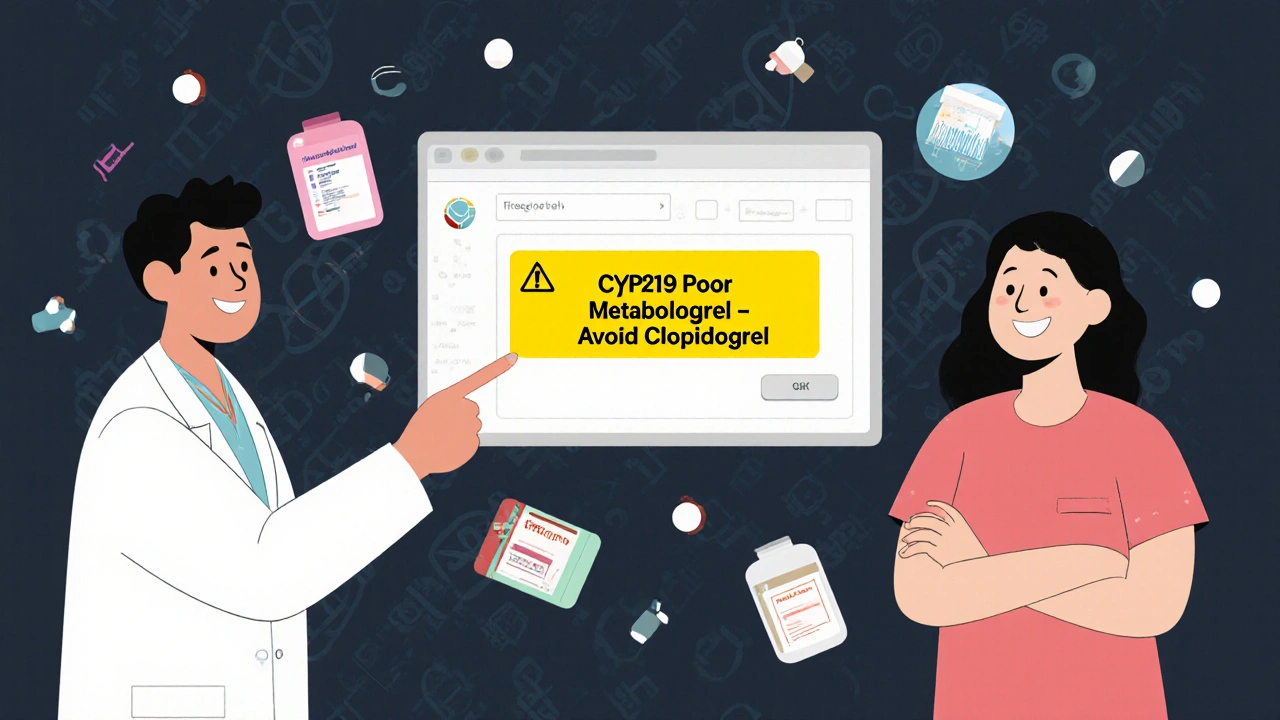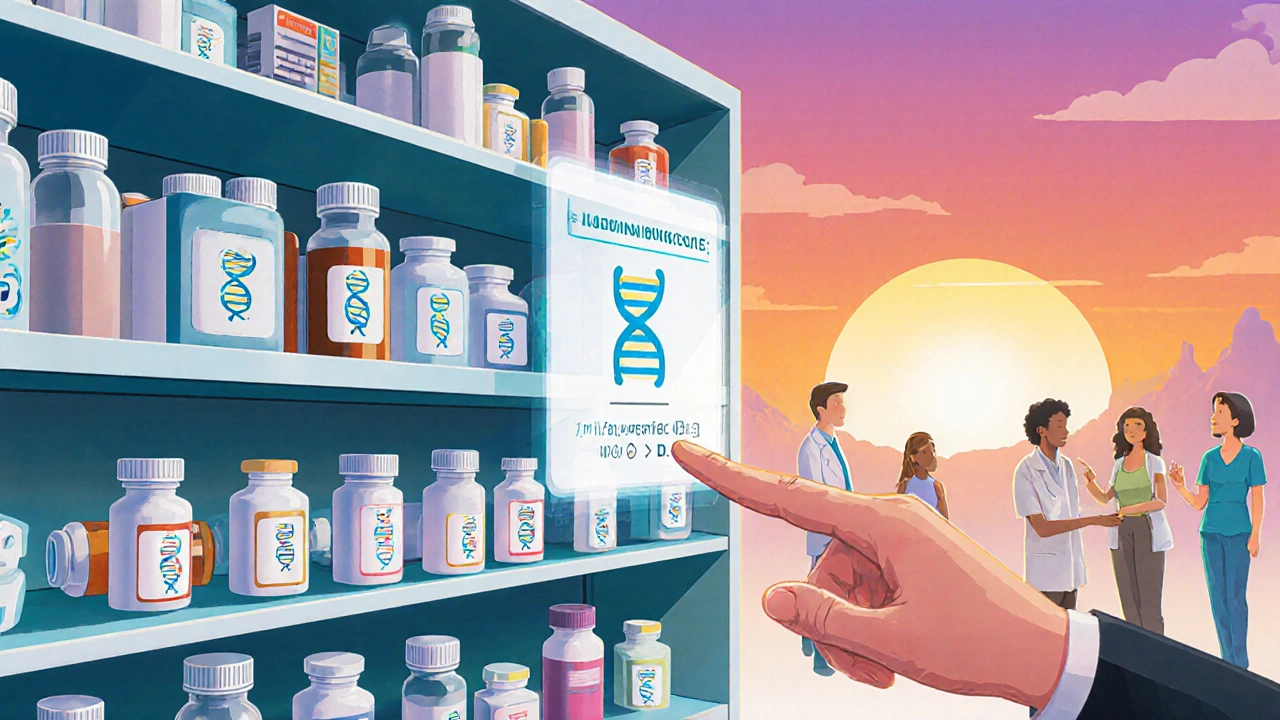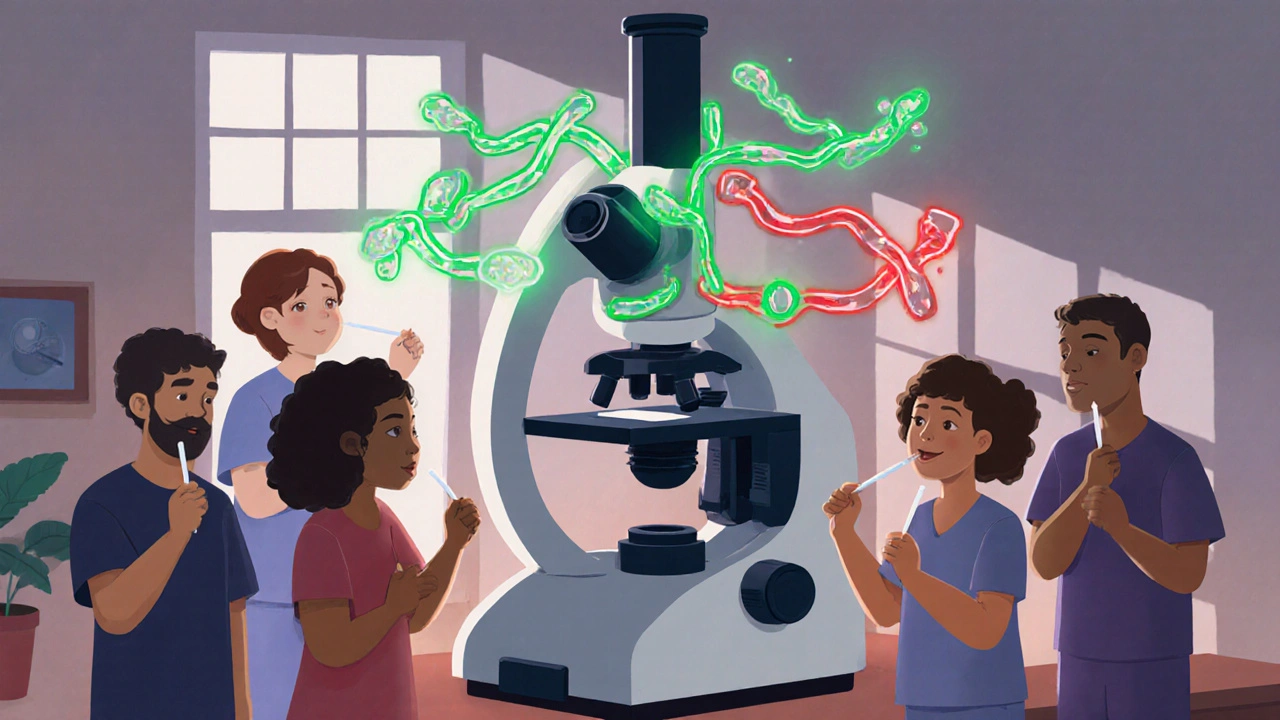Every year, hundreds of thousands of people end up in hospitals not because their condition got worse, but because the medicine meant to help them made things worse. These are called adverse drug reactions-unexpected, harmful side effects that can range from a nasty rash to life-threatening organ damage. For many, it’s not bad luck. It’s their genes.
Why Your Genes Matter When You Take Medicine
Not everyone reacts to the same drug the same way. Two people, same dose, same diagnosis, different outcomes. One feels better. The other ends up in the ER. The difference? Often, it’s hidden in your DNA. Pharmacogenetic testing looks at specific genes that control how your body breaks down and responds to medications. Some people are fast metabolizers-they clear drugs too quickly, so the medicine doesn’t work. Others are slow metabolizers-they hold onto the drug too long, leading to toxic buildup. These differences aren’t random. They’re inherited. Take CYP2C19, a gene that handles common drugs like clopidogrel (used after heart attacks) and some antidepressants. About 30% of people of Asian descent carry a variant that makes them poor metabolizers. If they take clopidogrel, their body can’t turn it into the active form. The drug fails. They’re at higher risk of another heart attack. Test first, and you can switch to a different medication before the damage is done.The Landmark Study That Changed Everything
In 2023, a massive study called PREPARE changed how we think about drug safety. Led by researchers from the University of Liverpool and published in The Lancet, it followed nearly 7,000 patients across seven European countries. Before prescribing any new medication, doctors tested them using a 12-gene panel that covered over 50 genetic variants linked to drug responses. The result? A 30% drop in serious adverse drug reactions. That’s not a small improvement. That’s like preventing one out of every three hospitalizations caused by medication side effects. What made this study different? It wasn’t reactive. It was preemptive. Instead of waiting for a patient to get sick and then testing, they tested before any drug was given. That’s the key. Once you know your genetic profile, you can avoid dangerous combinations from day one.Which Genes and Drugs Are Most Important?
Not every gene matters for every drug. But for a handful of gene-drug pairs, the evidence is so strong that guidelines now say: test before you prescribe.- HLA-B*1502 and carbamazepine (used for epilepsy and bipolar disorder): People with this variant, especially in Southeast Asia, have a 95% lower risk of Stevens-Johnson syndrome-a deadly skin reaction-if they’re tested first.
- TPMT and azathioprine (used for autoimmune diseases and cancer): If you’re a slow metabolizer, this drug can destroy your bone marrow. Testing cuts the risk of severe myelosuppression by 78%.
- CYP2D6 and codeine: Some people convert codeine to morphine too quickly. In children, this has led to fatal respiratory depression. Many countries now warn against codeine use in kids under 12.
- SLCO1B1 and simvastatin (a cholesterol drug): A certain variant increases the risk of muscle damage by 4x. A simple test lets doctors choose a safer statin.

How Testing Works in Real Clinics
You don’t need a lab coat or a PhD to get tested. A simple cheek swab or blood draw is all it takes. Results come back in 24 to 72 hours in most modern hospitals. The data gets added to your electronic health record, and if a doctor tries to prescribe a drug that could be risky, the system pops up an alert. At the University of Florida Health system, they’ve been doing this since 2012. They tested over 10,000 patients. The result? A 75% drop in ADR-related emergency visits. The upfront cost? $1.2 million. The payback? Less than two years, thanks to fewer hospital stays and fewer lawsuits. The testing panel used in PREPARE looked at 12 genes: CYP2C19, CYP2C9, CYP2D6, CYP3A5, SLCO1B1, TPMT, DPYD, VKORC1, UGT1A1, CYP4F2, SLC01B1, and HLA-B. Together, they cover more than 100 medications-from antidepressants and blood thinners to painkillers and chemotherapy drugs.What’s Holding Back Widespread Use?
The science is solid. The data is clear. So why isn’t every doctor doing this? First, cost. A full panel runs $200-$500 in the U.S. That’s not cheap. But when you factor in the cost of one hospitalization for an adverse reaction-often $15,000 to $50,000-it’s a bargain. Insurance coverage is improving. Medicare now pays for CYP2C19 and TPMT testing. Private insurers are following. Second, knowledge gaps. Only 37% of physicians feel confident interpreting results. A doctor might see “intermediate metabolizer” and not know what to do. That’s why training matters. Programs like the Clinical Pharmacogenetics Implementation Consortium (CPIC) offer free, up-to-date guidelines for 34 gene-drug pairs. They’re updated every quarter. Third, integration. If the test result doesn’t show up clearly in the electronic health record, or if the alert is buried in a menu, doctors will ignore it. Successful programs embed alerts directly into prescribing workflows. No extra clicks. No confusion. Fourth, diversity. Most genetic data comes from people of European descent. That means the tests are less accurate for African, Indigenous, and Asian populations. The NIH is now funding studies to fill these gaps. In June 2024, they added 126 new variant-drug links from underrepresented groups. Progress is happening-but it’s not fast enough.


prasad gaude
November 26, 2025 AT 09:39Man, this hits different when you grow up seeing your uncle take five different pills and still end up in the hospital. In India, we don’t always get the luxury of testing-but I’ve seen people just... stop responding to meds outta nowhere. No one tells you it might be your genes. It’s like your body’s whispering and everyone’s shouting over it.
My grandma took clopidogrel after her stent and got dizzy for weeks. No one thought to check CYP2C19. She just got told to ‘try harder.’ We need this everywhere-not just in fancy hospitals.
It’s not magic. It’s math. Your DNA is the original instruction manual. Why are we still guessing?
Timothy Sadleir
November 28, 2025 AT 09:04Let me be clear: this is not medicine. This is corporate surveillance dressed in lab coats. Who owns your genetic data? Who sells it? The FDA’s list of 329 gene-drug pairs? That’s not science-it’s a roadmap for pharmaceutical monopolies to lock you into their drugs.
And don’t get me started on ‘preemptive testing.’ That’s the first step to mandatory genetic profiling. Next thing you know, your insurance denies you coverage because your CYP2D6 profile says you’re ‘high risk’ for painkiller dependence. This isn’t progress. It’s control.
Jennifer Griffith
November 29, 2025 AT 03:44ok but like… i took codeine once and felt like i was gonna die? my doc was like ‘weird’ and gave me tylenol. turns out i’m a super metabolizer. why is this not standard?? i’m not even that into meds and i still got lucky.
also why is this $500?? i got a dna test from 23andMe for $99 and it told me i have 1% neanderthal. that’s less useful than knowing if i’m gonna keel over from a statin.
Leisha Haynes
November 29, 2025 AT 07:14Wow. This is the most practical thing i’ve read all year. I’ve been on 7 antidepressants and every single one gave me nausea or brain fog or both. My doctor just shrugged. ‘Try another.’
Turns out i’m a CYP2D6 poor metabolizer. If someone had told me this 5 years ago, i wouldn’t have spent 18 months crying in my car after work.
Stop acting like this is ‘experimental.’ It’s basic biology. If you’re on more than 2 meds, ask for this. Seriously. Your future self will hug you.
Andrew Camacho
November 30, 2025 AT 10:01Oh so now we’re going to blame genetics for bad prescribing? Brilliant. So doctors don’t need to learn anything anymore? Just scan the DNA and let the algorithm do the work? That’s not personalized medicine-that’s lazy medicine.
And don’t even get me started on the ‘93.5% of patients have actionable results.’ That’s not a win-that’s a warning. We’re poisoning 9 out of 10 people because we’re too lazy to think. This isn’t progress. It’s a bandage on a hemorrhage.
Also, who approved this? The same people who told us Vioxx was safe? The same people who pushed OxyContin? I don’t trust this. Not one bit.
Arup Kuri
December 2, 2025 AT 01:03in india we dont even have proper doctors how u expect us to do genetic testing? my cousin took malaria medicine and his liver exploded. no test couldve saved him. the real problem? no doctors. no hospitals. no clean water.
you rich americans think gene tests fix everything. but we still need food first. then medicine. then maybe your fancy dna scan.
stop pretending this is about health. its about who gets to be privileged
Dolapo Eniola
December 2, 2025 AT 20:56Bro this is why Africa is behind. We don’t even have the data. Most genetic studies are done on white people. So when they say ‘this drug is safe’-they mean safe for Europeans. Not us.
I’m Nigerian. My body breaks down drugs like a BMW in Lagos traffic. No one tested me for SLCO1B1 before simvastatin. I got rhabdo. Now I’m on a different statin.
NIH added 126 new variants? Good. But where’s the rollout? Where’s the funding? We need this in Lagos, not just in Boston.
And yes I’m mad. My cousin died because they gave her the wrong dose. She was a slow metabolizer. No one knew. No one cared.
giselle kate
December 3, 2025 AT 16:18Let me be the only one to say this: this isn’t about saving lives. It’s about profit. The pharmaceutical industry knows that if we test everyone, we’ll stop prescribing their expensive, dangerous drugs. They’ll lose billions.
That’s why they fund the studies. That’s why they push ‘guidelines.’ They want you to think this is altruistic. It’s not. It’s a PR stunt wrapped in science.
And don’t tell me about ‘fewer hospitalizations.’ That’s just a cost-saving metric. They don’t care if you live. They care if you stop buying their pills.
Emily Craig
December 3, 2025 AT 23:21I’ve been waiting for someone to say this out loud and I’m so glad it’s you.
I work in primary care. We don’t have time. We don’t have training. We don’t have the system.
But when we DO use the test? It’s like turning on a light in a dark room. One patient had been on warfarin for 8 years with INRs all over the place. Tested for VKORC1. Dose adjusted. Stable for 2 years. No bleeding. No clots.
This isn’t sci-fi. It’s Tuesday. We just need to stop pretending we don’t have the tools.
Ask your doctor. Seriously. Just say ‘could my genes affect this?’ It’s not weird. It’s smart.